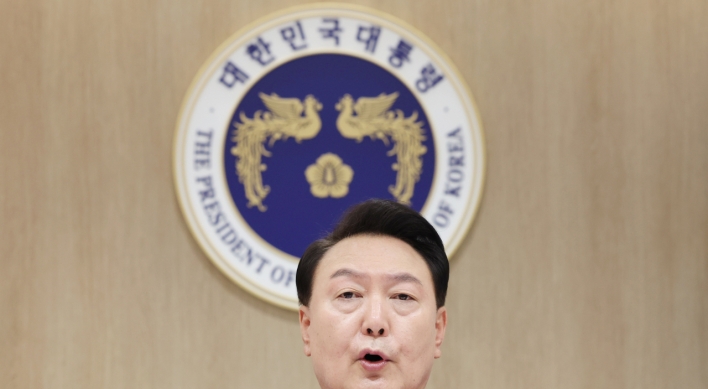WASHINGTON -- Former U.S. President Jimmy Carter will likely visit North Korea next month to broker rapprochement in U.S. relations with the reclusive communist state, which have chilled over the North's nuclear and missile programs and other provocations, a diplomatic source here said Wednesday.
"It is highly likely that ex-President Carter will travel to North Korea in about a month as the North Korean mission in New York has been arranging for the visit," said the source, who requested anonymity.
Carter is expected to be accompanied by former U.N. Secretary-General Kofi Annan and other prominent figures who are ready to be middlemen in U.S. relations with the impoverished but nuclear-armed state.
Carter visited Pyongyang in August and brought back Aijalon Gomes of Boston, who had been sentenced to eight years in a labor camp and fined about US$700,000 for illegally entering North Korea months earlier.
Carter was expected to play a role in mending U.S. relations with the North at the time, but he could not meet with North Korean leader Kim Jong-il, who had traveled to China for a meeting with Chinese President Hu Jintao. Kim made the trip in an apparent attempt to seek Chinese support for the unprecedented third-generation power transition to his youngest son.
Carter brokered a bilateral U.S.-North Korea deal during the first North Korean nuclear crisis in 1994, which led to the Geneva Agreed Framework later that year. The pact called for the freezing of the North's plutonium-producing nuclear reactor in Yongbyon, north of its capital, Pyongyang, in return for massive energy and other economic aid and diplomatic recognition by Washington.
The nuclear deal was scrapped in 2002 when the Bush administration labeled North Korea as part of an axis of evil and denounced Pyongyang for secretly enriching uranium in violation of the deal.
Six-party talks involving the U.S., North and South Korea, Japan, China and Russia came as a substitute in 2003, but have been stalled over U.N. sanctions for North Korea's nuclear and missile tests and, most recently, the North's shelling of a South Korean border island and a South Korean warship that killed 50 people last year.
Pyongyang also revealed in November a uranium enrichment plant, another way of making nuclear weapons separate from its plutonium program. The North claims its intention is to generate electricity.
North Korea last week suggested that the uranium issue be discussed at the six-party talks, calling for the resumption of the multilateral nuclear discussions without any conditions attached.
South Korea and the U.S. have said they will seek a U.N.
Security Council presidential statement to condemn the uranium program before moving on to the six-party negotiations.
China, North Korea's staunchest communist ally, wants the issue to be dealt with at the six-party talks and opposes Security Council involvement.
Washington says Pyongyang must mend ties with Seoul before any resumption of the multilateral nuclear talks.
North Korea last month refused to apologize for the provocations against the South, and walked out of a rare inter-Korean dialogue last month, thwarting hopes for an early resumption of the denuclearization-for-aid talks.
The U.S. recently refused North Korea's call for a meeting of defense ministers to discuss improvement in bilateral ties.
U.S. officials, however, have said they have received the North's request for food aid and are assessing the situation there amid reports that the U.S. may reopen food aid to the North, which was suspended two years ago over controversy on the transparency in food distribution.
Speaking to reporters, State Department spokesman Mark Toner repeated that the U.S. has "nothing really to announce" on any planned meeting with North Korean officials.
"We of course maintain contact with North Korea," he said.
"That's no surprise, and of course, we've been quite clear about what we want to see before six-party talks could continue."
Toner was referring to Secretary of State Hillary Clinton's remarks Tuesday that "there is an effort to try to get North and South Korea to start talking and to communicate with each other.
And we have ongoing contact, as does every country with North Korea, on certain issues."
A North Korean economic delegation, meanwhile, is currently on a U.S. tour at the invitation of the University of California-San Diego, although the State Department has categorized it as a private mission.
The North Korean delegation arrived in Los Angeles on March 19 and will stay in New York and several other cities until April 2, informed sources said.
Ri Gun, director general of the North American affairs bureau of North Korea's foreign ministry, is attending a seminar in Berlin this coming weekend.
The forum, hosted by the Aspen Institute, a U.S. think tank, is expected to serve as an informal venue to exchange opinions on reopening the deadlocked six-party talks, as some former U.S. officials who took charge of U.S. relations with North Korea are also attending the seminar.
(Yonhap News)
- ShinWon accelerates global expansion with big ESG push
- [Contribution] 6 reasons why a medical school quota increase isn’t the answer to health care reform
- 3 out of 5 young couples went through a rough patch
- Man commended for rescuing driver suffering from epilepsy
- [Photo News] Opposites United
- S. Korea to provide $12m to conflict-ridden Sudan
- Yoon vows to improve communication with people after election defeat
- S. Korea 'strongly' protests Tokyo's renewed claims to Dokdo, calls in Japanese diplomat
- Kim Jae-shin appointed ASEAN-Korea Center secretary-general
- Seoul shares open sharply lower as Israel warns of retaliation


















